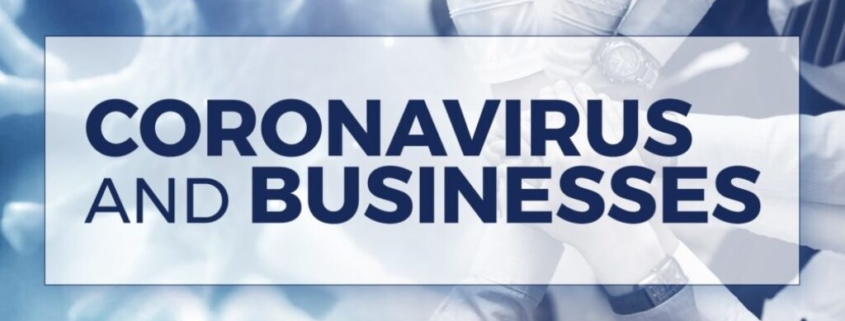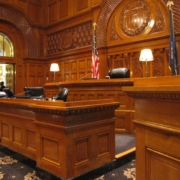Small Businesses and Covid-19 on March 30, 2020
Two weeks ago today, I was standing in front of Judge Styn in San Diego Superior Court expecting to get a one-week bench trial underway. This was after we had waived our jury the prior Friday when San Diego had suspended jury trials due to the Coronavirus. Judge Styn is 79 years old and the San Diego Courts were shut down the following day. For most of us, we’ve only been living with the impact of this virus for just two weeks, but for small businesses, so much has changed over those two weeks.
This article attempts to provide some resources for small businesses and individuals as we all navigate this global health crisis. Things are changing rapidly, but this article is current as of today and has a lot of useful information for small businesses.
We are in the middle of what is going to be a very difficult time for small businesses. With a focus on bankruptcy and real estate, our practice has been busy with calls from business owners (landlords, tenants, lenders) who are all grappling with issues never before seen and seeking answers to questions they have never faced before. On the Debtor side, the early calls focus on companies that were mostly on very unstable ground before they got to us. COVID-19 is the proverbial straw that broke the camel’s back for these companies. For creditors and landlords, the preliminary calls have not yet been defaults, but, rather, game plans for work arounds and updates for new laws concerning evictions and foreclosures.
The biggest impact of the Coronavirus is to retail businesses and restaurants. At a fundamental level, 90% of retailers are shut down completely and fast food is the only restaurant that can even operate in this environment. Retailers employ 15.6 million people in this country while and another 16 million are in retail. Together, they make up approximately 20% of the workforce of this country. The vast majority of those people are currently unemployed and there are many looming questions as to whether those businesses are going to be able to survive the downturn.
It goes without saying that we are in the early stages and any fallout will largely depend on how long this process takes. California’s “Stay At Home” order issued by Governor Newsom was issued on March 19, 2020 and, as of the date of this writing, all signs suggest that it will be in place through the end of April, at least; but there is a huge difference between six weeks and 12 weeks in terms of the economics of this situation and the impact it will have on businesses and business owners alike.
As the crisis further develops, new orders, mandates and regulations will likely be issued, and we will try and update you with these as they are released. The hope for businesses is that California can strive to stay ahead of the fallout and provide as much as clarity on the situation, for better or worse, as the matter unfolds.
The Courts and the Stay at Home Order:
The San Diego Superior Court closed on March 17th and will continue to be closed through April 3rd. There will be no jury trials until at least May 22nd and all existing jury trial dates have been continued 60 days. While certain emergency services are available, it is widely expected that the April 3rd date will be extended for at least another two weeks as San Diego is entering into an acceleration phase for the disease. This is especially likely as the federal government has now advised that the current social distancing guidelines remain in place through April 30, 2020.
What this means is that the Courts are essentially inaccessible through most of April. What is already an overburdened system will be backlogged by another 2 months of cases making access to the judicial system that much more difficult and expensive.
Federal Courts have not yet suspended operations, at least not in the 9th circuit. Some oral arguments have been postponed, but the Bankruptcy Court has issued an order allowing for telephonic appearances for all oral arguments and a number of orders to allow filings to continue. In large part because the federal system has transitioned to an electronic system over two decades ago, they appear to have been well positioned to allow for appropriate social distancing without a complete cessation of activity.
Mortgages and Covid-19:
With 2008 in very recent memory, the federal government and banks are gearing up for a number of missed payments, whether its commercial or residential. Fannie Mae and Freddie Mac have announced programs for loan forbearance for both residential and commercial mortgages for up to 12 months. One of the challenges from a borrower’s perspective is determining whether your loan is owned by one these two juggernauts, as the servicing company will differ from the entity listed on the deed of trust that will likely differ from the entity who owns your loan.
To put things into perspective, the total amount of mortgage debt is estimated at $15.8 Trillion and Fannie and Freddie are estimated to have guaranteed or own somewhere around $4.4 Trillion (See also Bloomberg). The important thing is that you may be one of the 28 Million loans that may be owned by Fannie or Freddie that may make you eligible for relief. Below are some links that will help you find out if you have a Fannie Mae or Freddie Mac Loan.
California has also teamed up with the largest banks and about 200 local lenders to provide some relief. Essentially, if your lender is one of the institutions identified at the link below, the lender will grant a 90-day moratorium on payments for COVID-19 related missed payments. Additionally, any missed payments resulting from COVID-19 will not affect your credit ratings. There shall also be a 60-day moratorium from these institutions on foreclosures. A current list of participating lenders and servicing agents is below.
Evictions and Covid-19
There are essentially two main things that will impact evictions in California in the short run. First, there is the issue of whether the Court will actually be open. For now, Courts are closed until April 3rd and I’m fully expecting them to remain closed through April 17th.
More importantly, on March 27th, the state of California has imposed a moratorium on evictions caused by Covid-19 hardships. That moratorium will be in effect until May 31st. In short, if a tenant has documentation demonstrating loss of employment or reduction in income due to the COVID-19 pandemic, then the tenant cannot be evicted for nonpayment of rent and the tenant should notify the landlord immediately. If a tenant falls within this moratorium, the tenant will have an additional six months to pay the unpaid rent. However, it is important to highlight that this is NOT a moratorium on a tenant’s obligation to pay rent if they are otherwise unaffected by COVID-19.
This is obviously a developing story and we’ll update you as we learn more. Broadly speaking, any real hardship in this environment can at least in some part be attributed to COVID-19 and, if a tenant’s employment or income has been lost from the hardship and can be documented, then the tenant should be protected under the moratorium.
Summary of the $350 Billion stimulus package:
On Friday, the federal government passed a $2 Trillion stimulus bill. While large chunks are dedicated to beefing up COVID-19 responses ($275 Billion), maintaining large businesses ($500 Billion), and direct injections to Americans in need ($560 Billion) (See https://howmuch.net/articles/breakdown-coronavirus-2t-economic-stimulus), $350 Billion has been earmarked for loans to small businesses.
That’s a lot of loans. The SBA estimates that there are 30 million small businesses in the US, which means this stimulus provides for an average of more than $10,000 per business in the US. The challenge will clearly be the administration of these loans. If you’re a small business and your vision for the next 3 – 6 months is cloudy, you need to start the application process right away. The SBA is notoriously slow at processing applications, and if you wait, you will miss the window.
The details as we understand them are as follows:
- stablishes and provides funding for forgivable bridge loans;
- loans will cover from February 15, 2020 and end June 30, 2020;
- businesses, nonprofits, self-employed individuals, sole proprietorships, and independent contractors with less than 500 employees are eligible;
- loans are capped at the lesser of $10 million or 2.5 times the total of the applicant’s average monthly payments for payroll costs for 1-year prior to obtaining the loan;
- proceeds may be used for payroll costs, group health care benefits, employee salaries, commissions, compensation, interest on mortgage obligations, rent, utilities, and interest on debt obligations (approved expenses) incurred before the covered period;
- no personal guarantees or collateral are required for the loans;
- the loans are non-recourse so long as the proceeds are used for an approved purpose;
- any balance remaining on the loan after forgiveness shall be for a 10-year term at an interest rate not greater than 4%;
- loans may be eligible for forgiveness of indebtedness in an amount equal to the sum of approved expenses incurred during the 8-week period after loan origination;
- forgiven loan amount may be reduced based upon the number of employees and adjustments in reduced salaries and wages;
- canceled indebtedness is excluded from gross income;
- provides additional funding for grants and technical assistance;
- establishes limits on requirements for employers to provide paid leave; and
- strengthens unemployment insurance, which could potentially add $600 per week for up to four months on top of what a state would give beneficiaries.
(From https://www.lexology.com/library/detail.aspx?g=e7a31eb2-9263-48ff-94d9-0947a0af8073)
The loans themselves are broken down into two major types, the Paycheck Protection Program (PPP) and the Economic Injury Disaster Loan (EIDL). Only the PPP is eligible for loan forgiveness based on maintaining a certain number of employees. The PPP must be applied for through your local bank, while the EIDL must be applied for directly through the SBA.
Matt Garrett, the CEO of TGG Accounting, just did a fantastic webinar on the stimulus package this morning. As of this email, it’s not up on TGG’s website, but I’m hopeful that it will be soon. For those looking to take advantage of the stimulus package for small businesses, this video is an excellent resource. Matt and his team are well ahead of the curve on the stimulus package and we all need to take advantage of their expertise as TGG has been extraordinarily generous in compiling, organizing and sharing their research. See: https://tgg-accounting.com/blog/

Other Bankruptcy News: Chapter 5 Bankruptcy
On February 19th, and, remarkably, completely unrelated to the Coronavirus, the federal government passed a large amendment to the bankruptcy laws that will make bankruptcy more accessible to small businesses. Welcome, the Chapter 5 bankruptcy. For practitioners, it is essentially a hybrid between a Chapter 11 and a Chapter 13 bankruptcy and businesses with less than $2.7 Million in secured debt are eligible to file.
Up until this point, filing a bankruptcy for a small business required a certain level of overhead that made it extraordinarily cost prohibitive for small businesses. It is extremely difficult to rationalize adding significant legal expense to an already overburdened business in order to justify filing a Chapter 11 bankruptcy and, as a result, it really remained only a nuclear bomb option for most small business debtors.
The new, Chapter 5 does away with much of the overhead associated with a Chapter 11 including the costs associated with maintaining a creditor’s committee and producing a disclosure statement. More importantly, the Chapter 5 allows you to “impair” creditors without a vote of those creditors so long as the distribution to them is “feasible”, does not “unfairly discriminate”, and is “fair and equitable”. Effectively, the Chapter 5 allows for a discharge over the course of time, which, while possible in a Chapter 11, was extremely difficult.
The hardest hit small businesses are retailers and restaurants. The stay at home orders have effectively shut down most of these businesses. While many costs in these types of operations are scalable, the two that are not are going to be rent and debt service.
Rent is a particular problem for restaurants and retailers. Unlike a law firm, who we are learning can function from home or pretty much anywhere, a restaurant or retailer is intimately tied to its location. What is more difficult is that, under California law, a commercial lease terminates likely at the end of a validly issued notice to pay or quit, not a judgement for possession. (See In re Windmill Farms.) What that means is that even in bankruptcy, a lease cannot be reinstated once the notice to pay or quit has expired.
Because of the nature of retail and restaurants and how COVID-19 has impacted this particular group of businesses and the “short fuse” associated with lease terminations, it is likely that we are going to see more Chapter 5 filings over the coming 12 months.











